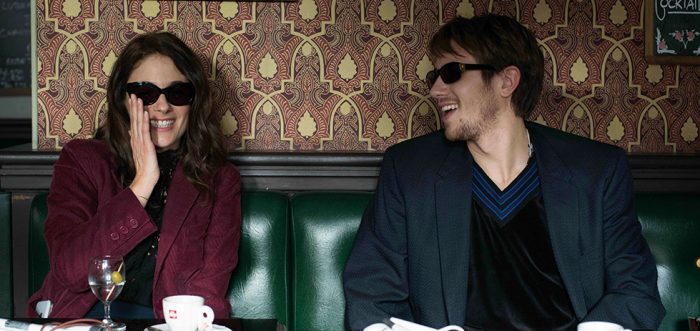
La Prunelle De Mes Yeux is an unusually self-aware romantic comedy by director Axelle Ropert, who averred the romcom label for her 2013 feature, Tirez la langue, Mademoiselle, despite admitting the film was both romantic, and a comedy. La Prunelle De Mes Yeux, though undeniably part of that genre, exploits and exaggerates the conventional melodramaticism at the center of the romantic comedy to great effect. Two struggling musician brothers, Theo and Leandro (played by Bastien Bouillon and Antonin Fresson), move into the apartment of sisters Elise and Marina (Mélanie Bernier and Chloe Astor) and, after immediately alienating each other, begin a clumsy process of sparring and wooing. With Theo and Leandro’s dedication to heritage and each other—expressed through their love of the traditional Greek rebetiko genre—and Elise and Marina’s supportive intimacy, both pairs of siblings are likeable and charming to the audience, which only makes their constant offending of the other pair even more amusing.
The fast cuts of the opening scenes establish the predicament of the brothers, finding sharp contrast when a young child requests they interrupt the upbeat wedding dance music to play a sadder song. The child tells them “sadness has no age,” and this playful melodramaticism engages the audience and establishes the film’s tone. The parodying of sincere anxiety is matched by the parodying of sincere conceits, particularly gleeful send-ups of masculine aggrandisements. Theo’s ridiculous romantic monologues are a good example: not only are they hilariously bad, but we also watch him recycle them for different women, eager each time to have them swoon at his genius. The joke becomes not only the monologue itself, but also his rampantly self-absorbed objectification of the women he dates. The driving plot device of the film—Theo pretending to be blind out of aggravation with Elise—is so amusing in part because the laughs are often at, not with, the unjustifiably self-righteous Theo. Certainly, there are also jokes made at the expense of the conceits of the women, but Ropert makes the skewering of masculine sensibilities a pleasing habit in the film.
The matter of whether or not using blindness as a gag is in good taste is not one that can be answered by those who are not blind: within the movie itself, as far as Theo’s attempt goes, the answer is a clear no, but with the caveat that it might still win you the love of your life. For the audience assessing the film, it’s more ambiguous: director Axelle Ropert said that she made numerous visits to the Young Blind Insititute to observe body language, but makes no mention of receiving any input.1 Interestingly, the body language of the two blind characters differs drastically, perhaps to visually sediment a respective trait: Elise, more malleable to her environment, regularly gropes along walls and bannisters, while Nicolai, who is a more decisively self-propelled character, does not.
A large part of the comedic appeal of the film is not only the pacing but the irreverent commitment to caricaturing—without mocking—very relatable fears, flaws and hardships: the flailing interpersonal relationships, the failing careers, the self-indulgent habits and insecurities that are a universal fodder for sincere anxiety. The disconcertingly easy and sudden drop from a casual occurrence or encounter to the chasm of existential angst that occurs (I hope) in all of us is usually either steadfastly ignored in mainstream cinema, or treated with a gravity that only deepens our fear. In La Prunelle De Mes Yeux, however, this existential chasm is at everyone’s feet, all the time: from jokes about the Greek financial crisis to a recreational coke habit bringing one face to face with the void, it feels like a relief to laugh.
The film is not only at its funniest but arguably its most sincere when it takes aim at social and economic failure, inadequacy, pettiness, and loneliness. Touching lightly upon the Greek financial crisis through the Greek identity of the brothers, La Prunelle De Mes Yeux seems to reach out directly to a demographic who feel a sense of instability and a fear of impending catastrophe, both political and personal, permeating their lives. While the final romantic scenes perhaps act as the standard fulfilment of the narrative promise of a romcom, they feel gaudy and saccharine compared to the darker strands of comedy. These scenes have less of the enjoyable self-awareness of the earlier humour, almost betraying its premise: the joy and relief is in laughing at the struggle, not subsuming it in a romantic fiction.
